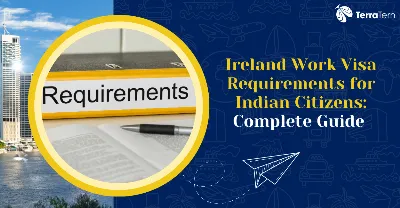Key Highlights
- Understanding Ireland Work Visa Requirements For Indian Citizens in 2025
- Ireland Work Permit Visa Requirements For Indian Citizens in 2025
- Ireland Critical Skills Employment Permit in 2025: Fast Track Option
- Latest Documents for Ireland Work Visa Application in 2025
- Ireland Work Visa Supporting Documents in 2025
- Ireland Work Visa Processing Times and Fees Structure in 2025
- Ireland Salary Requirements and Job Market Insights in 2025
- Ireland Work Visa Common Challenges and Solutions in 2025
- Post-Approval: Living and Working in Ireland 2025
- Latest Updates and Policy Changes 2025
- Conclusion
Ireland has emerged as a very popular destination for Indian expatriates in search of career advancement and a superb living standard. The country has an active economy with all the various big multinational companies in technology, finance and pharmaceuticals, thus making it a cooperative place to be. Being such a complete guide, this will help you to get your Ireland work visa with all its possible Ireland work visa requirements for Indian citizens explained in detail (from a job offer and the actual process of filling the application) and complete the process. Incorporating knowledge of these Ireland work visa requirements for Indian citizens is the first step to turn your dream of working in the Emerald Isle into a reality. As of late, there have been changes in policy to better simplify the process and bring in the very best talent, so this is a great time to examine your options.
Understanding Ireland Work Visa Requirements For Indian Citizens in 2025
dir="ltr">
There are certain underlying Ireland work permit visa requirements for Indian citizens that it is important to know before you start your journey. It is a two-stage process. First, you must obtain an employment permit issued by the Department of Enterprise, Trade and Employment (DETE), after which you apply for a visa. This is a process that your Irish employer will be pivotal in because they will, in many instances, be the ones to apply for the permit on your behalf. This part elucidates the essential Ireland work visa requirements for Indian citizens that you have to fulfil.
Standardisation of Eligibility
As a citizen of India, to be able to obtain an Ireland work visa would require you to meet a list of general criteria that would demonstrate your ability to fit into the job and your willingness to operate within Irish immigration regulations.
-
Valid Job Offer: It must be a formal and written job offer of work on a full-time basis (at least 39 hours per week) to a company registered and located in Ireland.
-
IELTS Grade 5.0 (6.0 on Critical Skills): You are required to have minimal proficiency in the English language. The desired score can differ according to the type of permit and occupation.
-
Clean Criminal Background Check: India Police Clearance Certificate (PCC). A clean criminal background report from India is necessary to prove that you have a clean criminal background.
-
Minimum Pay Rates Depending On Permit Type: The minimum payment rates are different for different permit types; therefore, your salary should be above the minimum threshold that supplements the kind of employment permit you are applying for.
Employer Requirements
Your potential employer also needs to fulfil some Ireland work visa requirements for Indian citizens to be allowed to sponsor your work permit application, and the Ireland work permit visa requirements for Indian citizens. These Ireland work visa requirements for Indian citizens make the business a legal venture and make the job desirable to the labour market needs in Ireland.
- EU/EEA/ Swiss Nationality In The Workforce of the Company: Normally, at the time of the application, the company would be compelled to have at least 50 per cent of its employees as citizens of an EU/EEA nation or Switzerland. It is a rule that can be dispensed with in the case of new start-up firms.
- Registered with Irish Revenue: The employer will have to be duly registered with the Irish Revenue Commissioners and in good standing.
- Labour Market Needs Test: The majority of the permits will require the employer to demonstrate that they have a valid reason and that they have made a genuine effort to fill the position with an Irish or EU/EEA national. This will include placing adverts on the EURES and Department of Social Protection websites for the position over a given period of time.
Also Read: Ireland Work Visa: Application, Requirements and More
Ireland Work Permit Visa Requirements For Indian Citizens in 2025

Ireland has different types of employment permits which are aimed at diverse categories of workers and professions. This point is crucial because it is needed to understand which permit is the appropriate one in your case, since they are very different in terms of their Ireland work visa requirements for Indian citizens, validity, and renewal opportunities. The following is an in-depth summary of the key permit types.
|
Permit Type |
Validity |
Minimum Salary |
Renewability |
|
Critical Skills Employment Permit |
2 years |
€38,000-€64,000+ |
Can apply for Stamp 4 after 21 months |
|
General Employment Permit |
2 years |
€34,000 |
Renewable for up to 3 years |
|
Intra-Company Transfer |
1 year |
€46,000 |
Renewable for up to 5 years |
|
Sport and Cultural |
2 years |
€30,000 |
Renewable for up to 3 years |
|
Dependant/Partner/Spouse |
2 years |
N/A |
Allows work without a separate permit |
|
Internship Employment Permit |
12 months |
National Minimum Wage |
Non-renewable |
|
Reactivation Employment Permit |
2 years |
N/A |
Renewable for up to 3 years |
|
Exchange Agreement Employment Permit |
2 years |
€30,000 |
Non-renewable |
|
Contract for Services |
1 year |
€46,000 |
Renewable for up to 5 years |
Ireland Critical Skills Employment Permit in 2025: Fast Track Option
Here are some Ireland work visa requirements for Indian citizens for a critical skill employment permit:
-
Critical Skills: The Employment Permit is the most beneficial type for highly skilled Indian professionals. It targets to lure employees into jobs that are in high demand and have been identified as crucial in the development of the Irish economy.
-
Criteria: To be eligible, you must have a job offer on the Critical Skills Occupations List and have an annual salary of at least 38,000 euros per year. Positions off the list need a supplementary amount of salary that is higher than the figure of 64,000 euros.
-
Advantages: The licence leads to direct residence. Holders can then claim a Stamp 4 permission after 21 months of employment; they will then be able to live and work in Ireland without a permit. Partners and spouses of permit holders, too, can apply for Stamp 1G, with which they are able to work without a permit.
-
No Labour Market Needs Test: Your employer does not have to place adverts in the locality regarding the position, which considerably accelerates your application.
Ireland Standard Route General Employment Permit
Indian citizens mostly have the option of the General Employment Permit to attain a work permit. It is used in those jobs that are neither in the Critical Skills Occupations List nor on the Ineligible Occupations List.
-
Eligibility: You should be offered a job, the annual wage of which is not less than 34,000 euros. In some occupations, such as the healthcare assistant, the bar is low. The employer also needs to meet the Labour Market Needs Test.
-
Validity and Renewal: The permit is usually given out with a first-time period of two years, and again is renewable up to an additional three years.
-
Path to Residency: Once you have been working five years or more on a general Employment Permit, you are eligible to apply to be granted long-term residency (known as a Stamp 4).
Latest Documents for Ireland Work Visa Application in 2025

A successful visa application hinges on a well-prepared and complete set of documents. Indian applicants must provide specific evidence to support their eligibility and the validity of their job offer. Let’s know more about the Ireland work visa requirements for Indian citizens!
Primary Documents Required
These are the core documents that form the basis of your application and are mandatory for all applicants.
-
Valid Indian Passport (12+ months validity): Your passport must be valid for at least 12 months beyond your planned date of entry into Ireland. You'll need copies of all pages, including previous visas.
-
Employment Permit From DETE: The original employment permit document issued by the Department of Enterprise, Trade and Employment.
-
Signed Employment Contract: A full copy of the signed contract of employment from your Irish employer, detailing your role, salary, and terms of service.
-
Two passport-sized Photographs: Recent, high-quality photographs that meet the specific Irish visa photo Ireland work visa requirements for Indian citizens.
Ireland Work Visa Supporting Documents in 2025
As well as the main works, you will require backup documentation to support the details given in your application.
-
Educational Credentials: Photocopies of your degrees, diplomas and transcripts. They might require being translated into English and having them apostilled.
-
Work Experience Certificates: Reference letters and certificates from past employers, which outline your work background and duties.
-
Bank Statements (6 months): To prove that you have enough funds to maintain yourself and that you are financially well-off for the first few months in Ireland.
-
Police Clearance Certificate: A PCC issued in the last six months by your local police station in India, establishing a clean record about cases of crime.
-
Medical Insurance Coverage: Evidence of health insurance, which can be through your employer.
Application Procedure for Indian Citizens
The path of applying for an Ireland work visa can be complicated. It is possible to divide it into three different steps and make it a successful movement: the employment permit application, the visa application, and the arrival procedures. Let’s know more about Ireland work visa requirements for Indian citizens!
Part 1 - Employment Permit Application
It is the initial and most important step of the procedure, and in most cases, it is initiated by your employer.
-
Submit Using The EPOS System: The employer publishes an application for an employment permit online using the Employment Permits Online System (EPOS).
-
Employer Applies: The employer posts the application and posts the required documents, which include the job offer, the company information and evidence of the Labour Market Needs Test (in case this is necessary).
-
Wait 8 Weeks To Get a Decision On The Permits: A new application may take eight weeks processing time, although this may increase depending on permit type and level of applications.
You and your employer will receive a reference number to track the application online; after this, the EP reference number will be received by you and your employer and enabling you to track the application online.
Part 2 - How to fill out a Visa?
After getting the permit to work, you can now apply for the entry visa to Ireland. Visitors of Indian nationality need to have a visa.
-
Apply Online With The AVATS System: Fill out the online visa application form at the AVATS system on the Irish Immigration Service website.
-
Book a VFS Global Appointment: Being the official partners of the Embassy of Ireland in India, you will have to book an appointment at one of the VFS Global centres to submit your documents.
-
You Should Submit Biometric Data: During your visit, you will give your fingerprints and a digital snapshot.
-
Pay Visa Fees: You need to pay the fees for applying for a visa, which may differ depending on the class of visa.
Also Read: Visa Sponsorship Jobs in Ireland: Latest Job Guide
Ireland Work Visa Processing Times and Fees Structure in 2025

Staying informed about current processing times and the fee structure is vital for planning your move to Ireland while knowing all the Ireland work visa requirements for Indian citizens. These details are subject to change, so always check the official DETE and Irish Immigration websites for the latest information. Let’s know more about Ireland work visa requirements for Indian citizens!
|
Permit Type |
Application Fee |
Processing Time |
|
Critical Skills |
1,000 |
8 weeks |
|
General Employment |
500-1,000 |
8-12 weeks |
|
Intra-Company Transfer |
500 |
8-12 weeks |
|
Visa Application |
60-100 |
4-6 weeks |
|
Visa Application (Multi-Entry) |
100 |
4-6 weeks |
Ireland Salary Requirements and Job Market Insights in 2025
The Irish employment sector is a dynamic one that is characterised by high demand for trained personnel in various important sectors. Recognising needs and demanded occupations to find a good job and succeed in the process of applying for a visa is very important. Minimal salary Ireland work visa requirements for Indian citizens on permits within 2025 have been revised to take into account the prevailing economic conditions. Let’s know more Ireland work visa requirements for Indian citizens!
Indian Hot Sectors
Indian professionals are in demand in certain fields where they are more appreciated for having talents and experience.
-
Information Technology (66,369 average): Ireland has a big tech centre, and there is a consistent demand for software developers, data scientists and cybersecurity professionals.
-
Healthcare (average 89,277): There is an ever-present shortage of the services of medical professionals such as nurses, physicians, and medical technicians.
-
Engineering (85,746 average): The engineering industry, especially the pharmaceutical and construction industries, is expanding, and that is where there are a lot of opportunities.
-
Finance and Banking (60,936 average): Ireland supports financially and thus has numerous employment opportunities in the field of finance and banking for qualified and competent personnel.
Ireland Work Visa Common Challenges and Solutions in 2025
When you fully understand the Ireland work visa requirements for Indian citizens, you should know the common challenges. Despite a structured process, Indian applicants often face hurdles during their work visa journey. Being aware of these challenges and having proactive solutions can significantly improve your chances of success.
Document Verification Issues
One of the most frequent problems is ensuring all documents are correctly prepared and verified.
-
Solutions: Ensure all official documents from India, such as educational certificates, are either in English or accompanied by a certified English translation. For certain documents, an apostille from the Ministry of External Affairs may be required. Double-check all dates, names, and details to ensure they match your passport.
Employer Sponsorship Challenges
Finding an employer willing and able to sponsor your work permit is a key challenge.
-
Solutions: Focus your job search on companies with a history of hiring non-EEA nationals. Many large multinational corporations have "Trusted Partner" status with the DETE, which streamlines the process. Use professional networking platforms like LinkedIn and specialised job portals to find roles that explicitly mention visa sponsorship. Tailor your resume to highlight your skills and experience in in-demand sectors to attract the attention of potential employers.
Post-Approval: Living and Working in Ireland 2025

Getting your work visa is just the beginning. This section provides practical information on what to do after you arrive in Ireland to ensure a smooth transition into your new life.
Pathway to Permanent Residency
Ireland offers a clear pathway to permanent residency for those on long-term employment permits.
-
5-year Continuous Residence Requirement: The most common route is to complete 60 months (5 years) of continuous legal residence in Ireland under a qualifying permit.
-
Stamp Permission After 2 Years for Critical Skills Holders: This is a major benefit of the Critical Skills permit. After 21 months of working on this permit, you can apply for a Stamp 4, which allows you to work without a permit and opens the door to long-term residency.
-
Irish Citizenship Eligibility After 5 Years: After holding a Stamp 4 for five years, you become eligible to apply for Irish citizenship. This requires you to meet certain criteria, including physical residency and good character.
Latest Updates and Policy Changes 2025
The Irish government regularly updates its immigration policies to respond to the country's economic and labour market needs. Staying on top of the most recent changes is essential for any applicant.
-
The minimum salary thresholds for both Critical Skills and General Employment Permits have been revised upwards in 2025. This is part of an effort to ensure that foreign workers are hired for high-value roles and are not undercutting local wages.
-
There have been minor changes to the Critical Skills Occupations List, with some roles being added and others being removed based on current labour market analysis. Always check the DETE website for the most current list before applying.
-
The application systems, EPOS and AVATS, have undergone technical updates to improve user experience and processing efficiency.
Conclusion
Securing an Ireland work visa as an Indian citizen is a structured process that requires careful planning, a clear understanding of the Ireland work visa requirements for Indian citizens, and a well-organised application. The first and most vital step is to obtain a valid job offer from an eligible Irish employer, followed by securing the appropriate employment permit. Whether you qualify for the fast-track Critical Skills Employment Permit or the more standard General Employment Permit, the pathway to a rewarding career and life in Ireland is clearly defined.
By following this comprehensive guide for 2025, you can confidently navigate the application process, from gathering essential documents to understanding post-arrival procedures. The demand for skilled Indian professionals in Ireland's thriving economy remains high, making it an excellent time to pursue this opportunity. Start your job search today, prepare your documents meticulously, and take the first step toward your new life in the Emerald Isle. To know more, visit TerraTern now!






